Corporate
identity 102-1 | 102-2 | 102-4 | 102-5 | 102-6 | 103-2: Indirect economic impacts | 103-3: Indirect economic impacts
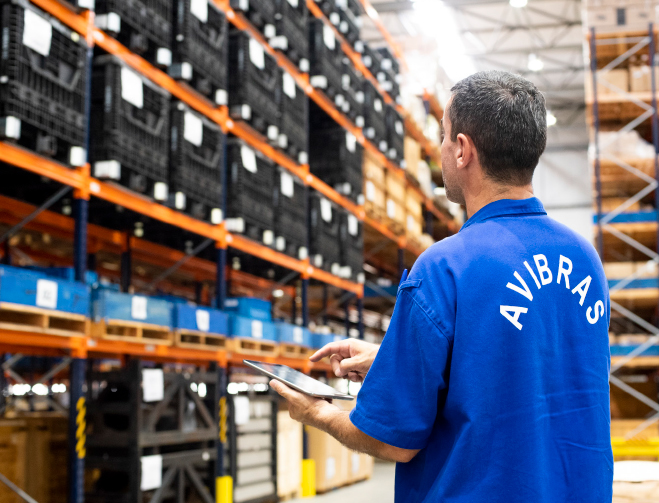

Avibras Aeroespacial S.A. is a company that is recognized globally for the quality and excellence of its products and systems. This privately owned, 100% Brazilian enterprise is accredited by the Ministry of Defence as a Strategic Defence Company. It develops its own innovative technology independently in the Aeronautics, Space, Electronics, Vehicle and Defence segments, sustainably generating value for its customers, shareholders, employees and society.
Located in one of the most important aerospace hubs in Latin America, since 1961 Avibras has helped drive the development of the Vale do Paraíba region, by means of the implantation of its facilities in the cities of São José dos Campos, Jacareí and Lorena, employing more than 1,800 people directly and generating over 4,000 jobs indirectly. 203-2
Underpinned by a strong and engaged organisational structure, its place in the history of the aerospace industry is guaranteed as one of pioneers in the design and development of aircraft, special vehicles and defence products in Brazil.
Its facilities include a number of laboratories, testing, manufacturing and storage facilities for the conception, design, development, production and testing of new product prototypes and the manufacture, commercialisation and provision of post-sale support for its products.
With a strong presence in the domestic and overseas markets, the company is distinguished by the development and manufacture of its Artillery Saturation Rocket System for Area Saturation (ASTROS), different rocket engines and missiles for ground, air and naval applications; fixed and mobile Command, Control, Communications, Computing, Intelligence, Surveillance, Target Acquisition and Reconnaissance (C4ISTAR) systems, as well as the Falcão Remotely Piloted Aircraft (RPA).
Avibras’ armoured vehicle production unit and its missile laboratories are among the most modern in Latin America.
The company’s Electronics and Software division develops, integrates and maintains major systems with complex architectures in the areas of Defence and Cybersecurity. The Avibras materials division produces essential inputs for the production of solid fuels for application in Brazilian Space Programme projects, while the vehicle division is the largest armoured vehicle manufacturing facility in the country.
Avibras spins off technology developed for the defence industry by its chemical, transportation, electronics electrophoretic painting (KTL) and quality assurance areas, offering surface treatment systems for metals, steel, galvanized steel and aluminium, mainly for the automotive industry, among others.
The company constantly strives for excellence and continuous improvement in its processes and products, which are compliant with domestic and international standards, including ISO, ASTM, Military Standards, STANAG, SAE, ABNT/NBR, FED-STD and InAvEx 1005. 416-1
Avibras market differentials include its Integrated Logistics Support (ILS) programme, which encompasses training, technical documentation, technical support for clients, the supply of simulators, equipment, replacement parts and special tools. The company offers Brazilian industry its high quality engineering structure and the services of its specialists.
The company’s first unit, founded in 1961 by a group of engineers from the Instituto Tecnológico de Aeronáutica (ITA), including João Verdi Carvalho Leite.
The industrial complex concentrates product engineering; mechanical, electro-electronic, chemical and composite material production for all the company’s rockets and missiles; as well as the largest armoured vehicle plant in Brazil. It also produces launch containers and has research laboratories for product development, quality control and validation.
The complex is being expanded with the construction of a factory to produce hydroxyl-terminated polybutadiene (HTPB), an essential input in the production of solid fuel, a fundamental capability for the rockets in the new Brazilian Space Programme (PEB).
In addition to the defence market, HTPB has a number of civilian applications, such as insulation, adhesive seals, liquid-proofing, encapsulation, coatings and films, among others.
HTPB production reinforces the industrial chemical vocation of the plant, which already produces ammonium perchlorate (AP), another essential component in the manufacture of solid fuel.
We strive for technological innovation, results and success in the development of projects and partnerships
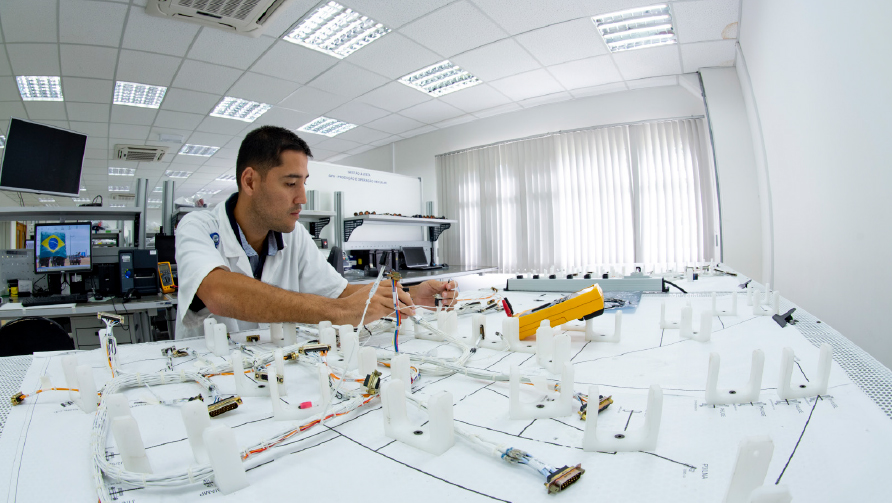
To pursue the best possible results, ensuring the dedication and engagement of all.
To develop the company’s own innovative, independent technology in the fields of Aeronautics, Space, Electronics, Vehicles and Defence, generating sustainable value for customers, shareholders, employees and society.
To be a benchmark in Brazil in technological independence, characterized by unique solutions, robustness, technical boldness, competitiveness and responsibility, always guided by the nation’s broader interests.
To rigorously ensure safety inside and outside the workplace and the security of information and assets on the broadest level possible.
All employees are expected to comply with internal procedures, demonstrating willingness, keenness and awareness.
Honouring commitments to customers is essential.
To boost competitiveness, control cash flow and leverage results.
Healthy workplace – To ensure that the company is a great place to work where employees can achieve fulfilment.
Sustainability – To obtain a fair profit while serving society, being useful to the Nation and driving economic, social and environmental sustainability.
Safety and security – To rigorously ensure Safety and Security in the Broadest Sense: occupational safety, asset security, information security and safe commuting.
Quality – To pay attention and get things right the first time. Quality depends on the individual! Drive quality in all our activities. Strive for excellence in all our responsibilities.
Respect for people – To value the human capital that identifies with the company culture remaining permanently updated, innovative and productive, constituting a living example of evolution without revolution.
Team spirit – To be capable of working alone and in teams, showing mutual respect, zeal and willingness, without stealing the limelight. To engage in open dialogue.
Innovation – To maintain a permanent state of alert, backed by sources of competitive advantage, to exploit opportunities to use and commercialise the organisation’s technology in new market niches, responding rapidly and with quality to client requests.
Resilience – To organize the company for consistent growth, avoiding adventures that might put its survival at risk.
Strategic technology – To diversify markets and stabilise revenues, based on the knowledge and technologies developed.
Guidelines for success – To use Internal Procedures (PI in the Portuguese acronym) in a creative, proactive manner, as a recipe for success in the pursuit of leading edge solutions. To focus on results and collaboration, assuming ownership of the company’s goals.
Valuing principles – Commitment to the company’s values. Wherever we are, we will always be Avibras professionals.
Focus on results – To act in an integrated and planned way, aimed at optimising time and resources in order to achieve our goals and meet our deadlines with quality.
Harmony with the environment – Commitment to the best environmental practices and to conserving biodiversity in the company’s factories. Care for and harmonious interaction with the environment.
Business conduct – Commitment to doing business with integrity, effectively applying the Code of Ethics and Conduct, in addition to observing Management, Internal Procedure (PI in the Portuguese acronym) and Work Instruction (ITR in the Portuguese acronym) Manuals. Continuous improvement in compliance and in anti-corruption preventive systems.
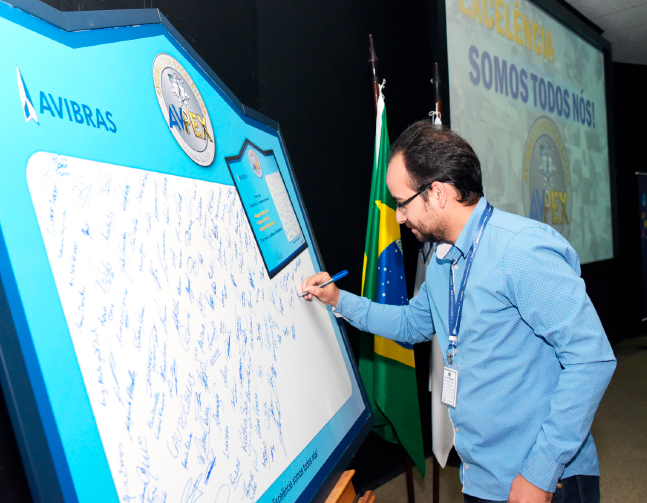
Avibras is a major player in the Brazilian defence industrial base (BID) and a key exporter of products and services to the military arsenals of diverse countries in the Middle East, Asia and Africa, differentiated by quality and by excellence in post-sale service.
The company’s products and services are not restricted to equipment supply, encompassing technical assistance for the execution of tests, munitions supply operational maintenance and the upgrade of systems and equipment to more recent versions, as well as training for local operators.
The quality of Avibras products and its excellence in post-sale services have strengthened the company’ image, opening up business opportunities in new markets, promoting greater value generation in the form of employment, revenues, taxes and return for shareholders, as well as driving innovation and technological capabilities in the country.
The company’s products are characterized by quality and credibility, resulting in the successful penetration of new global markets, where its equipment is widely accepted by countries engaged in restructuring their armed forces.
Avibras’ scientific and technological capabilities enable the development and enhancement of new technologies, new products and solutions in the fields of Aeronautics, Space, Electronics and Defence Vehicles, consolidating the company as a leader in defence products on a national and global level.
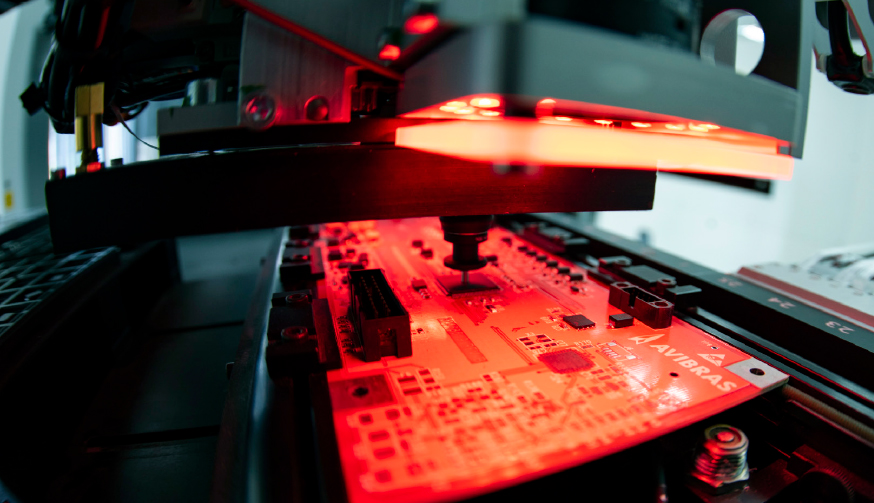
In the domestic market, Avibras participates in the main programmes undertaken by the Brazilian Ministry of Defence and Armed Forces for the National Defence Policy (PND) and the White Book. One of these is the Brazilian Space Programme (PEB in the Portuguese acronym). In 2018, verticalisation or in-company production of high technology items, one of the company’s main strategic thrusts, helped to position Brazil in the select club of ten countries having the capacity to produce fuel propellants – such as ammonium perchlorate and hydroxyl-terminated polybutadiene –, to build turbines and to test engines for long-range missiles.
These developments by the Avibras engineering team are for the production of accessories and engines of the S50 – a 12-tonne rocket engine, the main propeller of the Micro-Satellite Launch Vehicle (VLM-1), in a project executed in partnership with the Brazilian Air Force’s (FAB) Instituto de Aeronáutica e Espaço (IAE).
In November 2018, the IAE and Avibras successfully carried out the first pressurization, acceptance and propeller engine case rupture tests on the S50, achieving better results than expected, constituting a key moment in the history of the Brazilian Space Programme. The tests were conducted in the Avibras installations and showed that the design is optimised and fulfils performance and safety requirements, thus ensuring Brazil’s technological autonomy in the aerospace industry.
Another highlight is the Strategic2020 ASTROS Programme, a benchmark in performance and operational reliability, adopted in Brazil by the Army and the Navy, as well as by diverse other countries. The programme, which has Avibras as its focal point, is one of the drivers of the transformation of the Brazilian army, with a scope that includes research and development projects, acquisitions, vehicle modernisation and the construction of physical structures. In 2018, the new products presented by Avibras included the AV-SS 40 G rocket and the AV-TCM tactical cruise missile with a range of 300 kilometres.
In partnership with the Brazilian Air Force, the company contributes to the FX-2 programme with the 5th generation air combat missile A-Darter, which should equip the air force’s new Gripen fighter planes.
In 2018, Avibras initiated the qualification phase of the Anti-Ship Surface Missile (MANSUP), developed in partnership with the Navy and other companies in the defence industrial base. The company is responsible for supplying the rocket motor, for developing the safety and arming unit (SAU), the wings, the fins, and the lashings for various parts of the missile, as well as for assembling and testing the prototypes.
A key characteristic of product and technology development at Avibras is the Triple Helix, based on relations between universities, companies and government, aimed at driving the production of new knowledge, technological innovation and economic development.
Using this model, Avibras developed the tactical cruise missile, from product conception to the engineering plans, test flights, prototypes and the definition of aggregate inputs, with advanced ASTROS System technology.
The work also includes the new MK6 ASTROS vehicles and the modernisation of MK3 vehicles to MK6 specifications, as well as the supply of integrated simulators which represent the state-of-the-art in training and simulation.
Avibras also works jointly with the Army Technology Centre (CTEx), the Navy Research Institute (IPqM) and the Aeronautics Aerospace Science and Technology Department (DCTA) on the development of diverse products and services for national defence.
ASTROS: a high added value product commercialized in the domestic and international markets
SKYFIRE Air-to-Ground
Latest generation 70 mm air-to-surface rocket system.
AV-VBL
Light, armoured multi-purpose 4-wheel drive vehicles.
Falcão RPA
Remotely Piloted Aircraft.
ASTROS
(Artillery Saturation Rocket System for Area Saturation) – Highly mobile multiple rocket launcher capable of firing different calibre rockets and missiles with a range from 9 to 300 kilometres.
The company develops and produces innovative, efficient, special armoured or non-armoured vehicle solutions for civilian, military or public security applications.
Avibras offers a surface treatment system for steel, galvanized steel and aluminium, primarily serving the automotive industry.
Beginning in 2012 and scheduled to end in 2023, the Strategic2020 ASTROS Programme involves research and development projects and the acquisition and modernisation of missile launch vehicles. In the illustration, the MK-6, equipped with a digitalised command and control system, as well as technologies such as GPS, encrypted radios, computers and digital navigation. Avibras, a company in the Brazilian Defence Industrial Base, is the main integrator for the Brazilian Army programme.
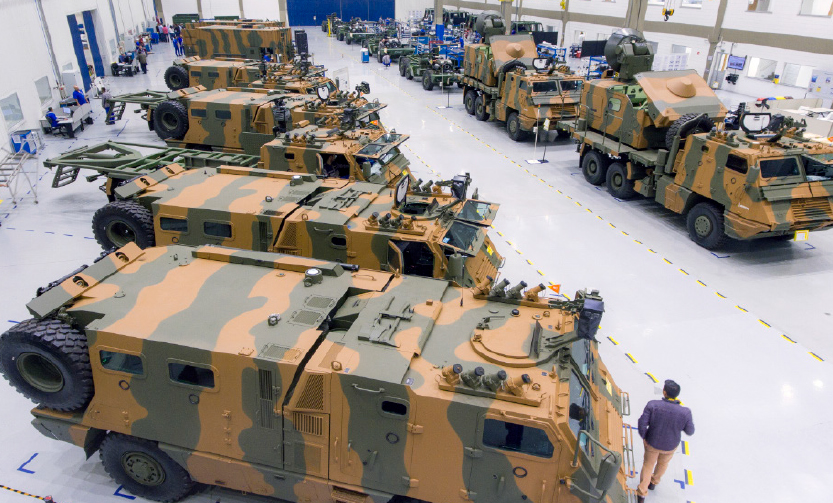
The Tactical Cruise Missile (AV-TCM) which employs 100% Brazilian technology, from conception, through engineering plans, prototypes to manufacture, is part of the Brazilian Army’s Strategic 2020 ASTROS Programme.
Avibras manufactures the motors and fuels for the Micro-Satellite Launch Vehicle (VLM-1) S-50 rockets, developed at the IAE, linked with the Aerospace Science and Technology Department (DCTA).
In the Anti-Ship Surface Missile programme, Avibras is responsible for the propulsion system (engine) and for the final assembly of the missile prototypes. The MANSUP will equip future Brazilian Navy vessels.
Avibras is part of the Brazil-South Africa binational programme for the development of the fifth generation A-Darter air combat missile, which will equip the Brazilian Air Force’s new Gripen fighter aircraft.
We contribute to the country’s development and sovereignty through mastery of space technology
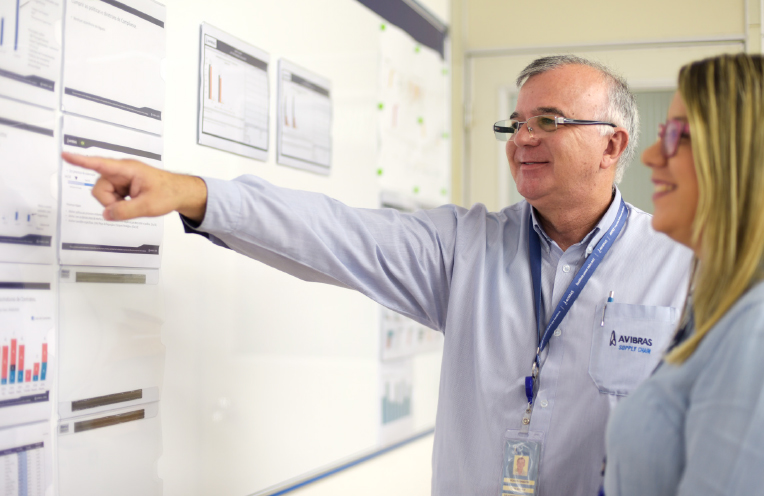
On the international scene, the Defence segment is strategic for Brazil’s sovereignty and political independence. It is also one of the most dynamic segments, involving ongoing research, development and innovation on an industrial scale.
The current increase in nationalist movements leads nations to pursue greater independence and sovereignty, in addition to driving the formation of regional blocks. These isolated countries or regional blocks are seeking to reinforce their defence systems in order to ensure the stability of their borders and to act as a factor of dissuasion.
The change in the posture of the United States and the strengthening of countries such as China, Russia and India cause neighbouring countries to strive to step up their technological independence and seek alternative non-aligned suppliers not dependent on traditional suppliers.
Civilian and military dependence on space exploration continues to grow. Access to images, signals, means of communication and global positioning systems, among others, will increase, as will the processing of information based on data collected and transmitted by satellites. The development and sovereignty of nations will depend on mastery of space technology.
An adverse effect of the expansion in the number of users and the increased capacity of communication and information systems is the increase in the number of cybernetic attacks executed by individuals and organizations, either ideological in nature or not. This results in the need to increase the protection of these communications and information systems.
The exploitation of common global domains – oceans, air space, outer space and cybernetic space – will probably be restricted to a limited number of countries. Those countries that do not have the capabilities will be unable to access and use the associated resources, and will need to resort to the purchase of services.
Regions of conflict in Africa, Asia and the Middle East continue to present political instability and its consequent conflicts, resulting in arms races in an attempt to guarantee the means for maintaining peace.
Countries that are incapable of developing technologies that increment their power of dissuasion in function of the high costs and knowledge involved will seek to form alliances in order to develop such capacity, given that armed forces will continue to depend on advanced technology.
Both emerging and developing countries are modernizing their forces, developing or enhancing their capabilities in terms of space (satellites and anti-satellite arms), air defence (radars, aircraft, air-to-air and air-to-surface missiles, anti-aircraft defence), surface-to-surface missiles (ballistic and cruise missiles), vehicles, stealth artefacts and/or remotely controlled equipment (air, land and sea), as well as submarines and rapid surface vessels. Additionally, they are modifying their computer networks, making them more secure and equipping them to execute cybernetic attacks. All of this is aimed at projecting power and ensuring defence against such projection by others.
Brazil’s physical geography, continental in size, with a long terrestrial frontier bordering on almost all the countries in South America and an extensive coastline and jurisdictional waters – increases the country’s geostrategic complexity, making the task of planning its defence an intricate one.
The funds invested in national defence have remained aligned with the overall growth trends of the Brazilian economy and, consequently, the government budget in the period, with no significant changes in proportion.
By means of national programmes and strategic partnerships, the Brazilian government has encouraged the resumption of investments in the country’s defence industry.
The expectation with these initiatives is to consolidate the excellent capabilities developed in the sector, promote the country’s technological progress and reduce the Armed Forces’ dependence on overseas suppliers.
In recent years the Brazilian defence sector has been undergoing an intense consolidation process which has generated positive expectations in relation to new projects in the industry.
In addition to being fundamental for guaranteeing the country’s sovereignty, the defence industrial base plays an important role in the economy, given the large number of skilled jobs and the technological innovations that it generates. Significantly, many of these innovations also have non-military applications.
Currently, Brazil’s defence industrial base is undergoing intense renovation, making the country increasingly competitive on the international market. The equipment and products manufactured by the Brazilian defence industry present growing technological capabilities and are present in the most diverse areas, ranging from foods, such as field rations, to armaments, munitions, armoured vehicles, parachutes, radars and large aircraft, for example.
Three technology sectors are considered to be strategic for national defence: nuclear, cybernetics and space.
These strategic sectors involve a high degree of complexity, requiring an advanced level of coordination and the integration of diverse actors and areas of knowledge.
To counter potential cybernetic attacks the entities involved in the country’s national defence seek to constantly enhance command, control, monitoring and intelligence capabilities.
Given its background and current stage of development in space activities, Brazil is still dependent on contracting foreign services. With the probable acceleration of investments and government initiatives, there is likely to be a reduction in this dependence on overseas services, which are subject to interruption by suppliers in accordance with their specific interests.
Operating performance 201-1 | 2018 | 2017* | 2016 | |
Net operating revenue (R$ thousands) | 627,939 | 1,672,000 | 1,391,000 | |
Net revenue per employee (R$ thousands) | 334 | 902 | 766 | |
Net margin (%) | 5 | 15 | 18 | |
EBITDA (R$ thousands) | 19,870 | 460,934 | 424,819 | |
EBITDA margin (%) | 3 | 28 | 31 | |
Economic value retained (R$ thousands) | 365,173 | 946,863 | 698,966 | |
Economic value distributed (R$ thousands) | 312,517 | 763,173 | 742,426 |
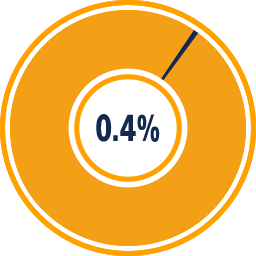
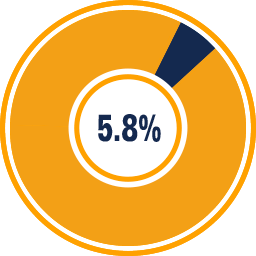
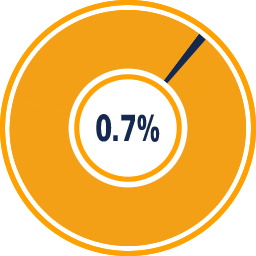
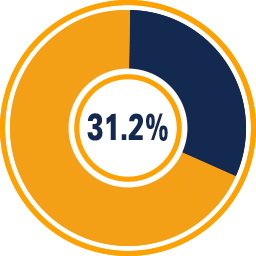
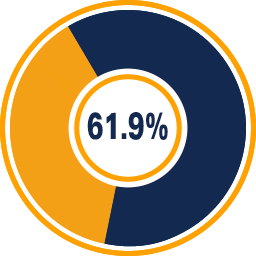
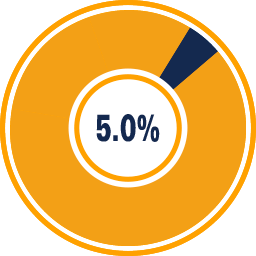
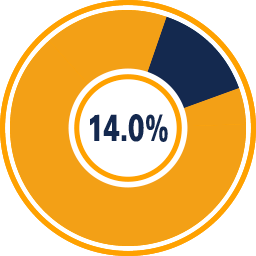
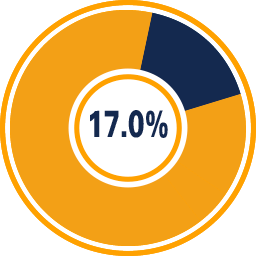
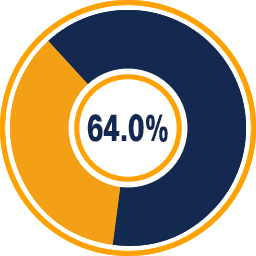
One of the 100 largest exporters in Brazil, Avibras ended fiscal 2018 with around 80% of its revenues coming from export operations, which totalled R$524.3 million. The company’s products and services are offered to all the global markets, particularly worthy of note being the Middle East and Asia and, more recently, regions such as Southern Asia, Latin America and Africa, markets where prospecting is focused on the Business to Government (B2G) market. In the domestic market, the sales force concentrates its sales efforts on the Armed Forces, the security, original equipment manufacturer (OEM) and integrator sectors, as well as the civilian market, where the company’s products enjoy strong penetration in the automotive sector. 102-6
Our people are the lifeblood of the company. Their efforts, energy and zeal ensure that Avibras generates and shares value on a continuous basis
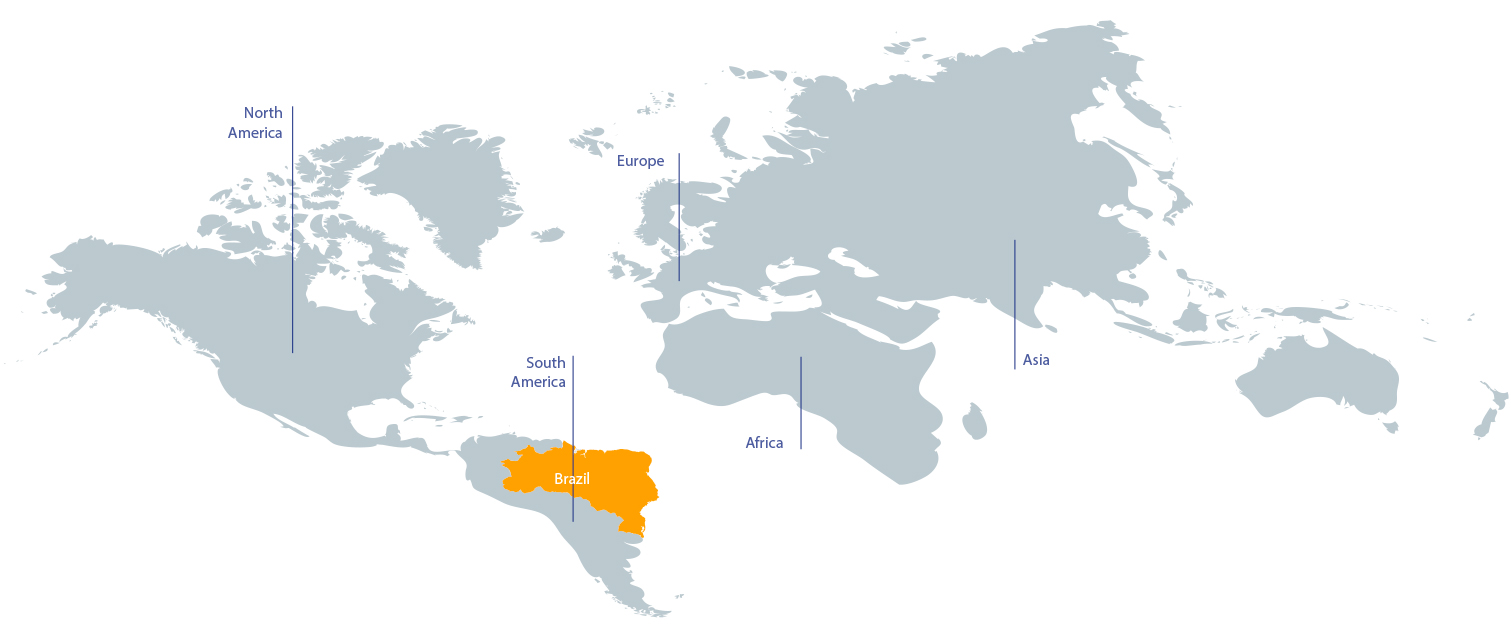
Defence product exports are regulated by Brazil’s National Military Material Exportation Policy (PNEMEM) dated 1974. Exports are subjected to a rigorous analysis in which the purchaser is required to present an End-User Certificate.
Under the policy, before speaking to the client, a company wishing to sell defence products to governments or private security organisations must send a preliminary request for negotiation to the Brazilian diplomatic corps, Itamaraty, in Brasília.
This body forwards the request to other areas within the Ministry of Foreign Relations for analysis of the situation of the country and region involved.
The recommendation is sent in an official message to the Director of the Department of Defence Products, a position occupied by a division general in the Ministry of Defence. This entity has the final word on the transaction.
In the event of divergences between the ministries, the President of the Republic may be involved in the process.
On December 27, 2018, the Chamber of Overseas Commerce (CAMEX), instituted CAMEX Resolution No. 107, which created the Time Brasil Defesa or Brazil Defence Team – to arrange finance and provide export guarantees for Brazilian defence products. Its attributions include the formulation of a specific commercial policy for the sector.
In each operation involving finance and the concession of guarantees for the export of defence products the technical group is responsible for coordinating and articulating the activities of the bodies involved in ensuring official support for credit.
The Brazil Defence Team will monitor and assess the opportunity and the convenience of granting official support for the credit. It will also propose parameters for negotiation and will compile and take into account factors related to foreign policy, defence and security.
Executive-Secretary of the Chamber of Overseas Commerce, as Chair
Ministry of Defence, which will exercise the role of Executive-Secretary of the group
Ministry of Finance
Secretary of the National Treasury, under the Ministry of Finance
Ministry of Industry, Overseas Trade and Services
Ministry of Foreign Relations
Banco Nacional de Desenvolvimento Econômico e Social (BNDES)
Agência Brasileira Gestora de Fundos Garantidores e Garantias (ABGF)
Avibras is one of the companies accredited as a strategic defence company by the Ministry of Defence, enabling it to obtain incentives such as inclusion in the Special Tax Regime for the Defence Industry (RETID), tax exemptions, including PIS/PASEP, Cofins and Industrialized Product Tax (IPI), as well as access to lines of financing from the Banco Nacional de Desenvolvimento Econômico e Social (BNDES) and the Financiadora de Estudos e Projetos (FINEP). Additionally, the company is allowed to participate in exclusive tenders, ensuring greater security in the development of new products.
The Avibras por Excelência (AVPEX) Programme
Avibras Culture
100% fulfilment of contracts in 2018
Formulation of competitive intelligence
Evolution in management and mitigation of risk maps
Updating of Code of Ethics
Leadership Development Programme
Knowledge management
Mentoring for job and salary plans
Post-career transition planning
Avibras Technology and Innovation Space (EATI in the Portuguese acronym)
Construction of the engine that will equip the VLM
Construction of a wind tunnel for turbine tests
Development of a tactical missile (for the ASTROS System)
Training of the engineering areas in computing simulation
Refinement of the chain of qualified suppliers
Start up of the construction of the HTPB plant in the Lorena unit
Revitalization of the ammonium perchlorate plant in Lorena
Modernization of the propellant mixing cells sector
Centralization of management of regulatory norms
Fulfil 100% of contract commitments observing the four Avibras priorities.
Ensure EBITDA margins that generate a sustainable income for the company.
Maintain the backlog constant.
Develop business excellence by means of the AVPEX management model.
Disseminate the Avibras culture by putting the four priorities into practice.
Ensure technological and innovation capabilities to provide support for new product and business development.
Implant a corporate compliance policy and ensure constant monitoring and compliance with policies and guidelines.
Maintain control over corporate risk monitoring and mitigation plans.
Security mapping with the review of processes, procedures, policies, risk treatment and tools, aimed at improving controls and monitoring.